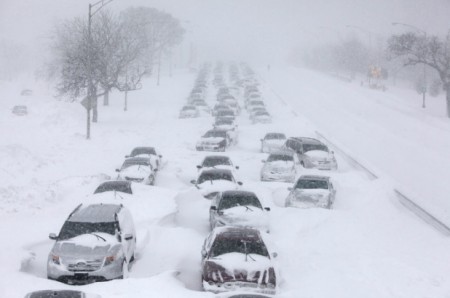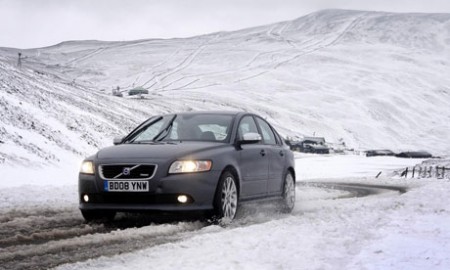By Lee Flynn (Freelance writer and expert in emergency food preparedness and food storage)
Winter comes with treacherous road conditions. Snow, sleet, and freezing rain can quickly cause road conditions to deteriorate.
While none of us like to think that it will happen to us, we should always be prepared for the worst case scenario.
In addition to making sure that your gas tank is always half full there are five must have supplies that should always be kept in your during the winter.
1) Emergency Flares
Whether you slip off the road and down an embankment or come to a halt on the shoulder of the road, it is always important to let other drivers know that you are there.
Emergency flares are small and can be easily stored in the glove compartment or trunk of your car.
An emergency flare lets other drivers know that you are in trouble.
Emergency personnel often use these flares at the sites of accidents and other emergencies to illuminate the area creating a zone of safety.
Other drivers on the road will immediately know upon seeing a flare that the other driver as an emergency.
Flashers on your car may only indicate to another driver that you have stopped and not that you need assistance.
2) Warm Clothes/Blankets
Warm clothes and blankets are especially important during the winter months.
If your vehicle becomes disabled, you will have no source of heat.
Your only way to stay warm will be by layering on extra clothes and blankets.
Blankets made out of thick material such as fleece fabric can also be used to block any areas where cold air may be entering the car.
You should always make sure to group together with other occupants.
Use extra blankets to block off a section of the vehicle if possible and huddle together.
The more people that are huddled together the more you can use each other’s body heat to try and stay warm beneath your layers.
3) Water & Snacks
Hopefully, you will never break down or have an accident during the winter and if you do it will be on a frequently traveled road, where you are soon to be discovered quickly.
However, just in case, you need to make sure that you have an extra supply of bottled water and a few snacks, such as crackers.
You should always keep at least three days’ worth of food and water in your car.
Winter emergency food stashes could ensure that you keep your strength up and keep hydrated for when rescue comes.
These items can be stored under your seats or in the trunk of the car.
4) Cell Phone Charger
Your cell phone will be your only means of communication until help arrives.
You need to make sure that you have a dependable cell phone charger and should keep your phone plugged in and at full power while driving.
This way if your vehicle stops and the battery is dead you will have a full battery on your phone to contact help.
Cell phone chargers are small and easy to store. They will plug into your car’s cigarette lighter or USB port.
5) First Aid Kit
First Aid Kits are handy to have in the car no matter what the season.
You should ensure that at a minimum your kit contains hand sanitizer, bandages or gauze, antibiotic ointment, pain killers (such as Tylenol), a first aid manual, alcohol swabs, tweezers, scissors, and a packet of tissues.
These kits can be purchased from local stores or on the internet easily.
If help cannot get to you quickly, they could prove to be very helpful.
You should always keep your first aid kit within easy reaching distance.
The glove compartment or under the seat is an excellent place to store these kits.
Just remember it is always better to hope for the best, but plan for the worse and be prepared.
* * *


